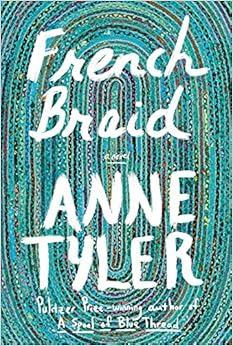4 Stars
At the beginning of this novel, Serena and James compare families, and Serena realizes hers is a narrow, not-open family which James describes as giving “’a whole new meaning to the phrase “once removed” when Serena doesn’t recognize a cousin. An in-law thinks of the family as “’narrow and unfriendly and judgmental.” That family, the Garretts, is the focus of this book.
Beginning in 1959 and ending in 2020, the book zeroes in on various members of the family beginning with Mercy and Robin, a rather mismatched couple who have three children: Alice, Lily, and David. Eventually, we meet the next generation as the three Garrett children marry and have children of their own. As time passes, the family becomes more and more disconnected; though there are not that many extended family members and though they live fairly close together, they get together only for weddings and funerals. The novel examines how the family comes to be so fractured.
This is very much a character novel. Each character whose perspective is given emerges as a round character with traits, flaws, and eccentricities made obvious. For example, Alice is the serious sibling who believes she knows best while, Lily is the wild child and David is the sensitive one. Once their personalities are formed, they behave consistently. Alice is the one who always likes to take charge and makes judgments about others whereas Lily often behaves unconventionally.
The characters are not always likeable, but the reader can usually empathize because s/he understands their personalities and motivations. Mercy, for instance, is not maternal; Alice thinks of herself as “older than her mother” and Lily doesn’t feel that “Mercy was any kind of mother.” Alice prepares the meals and worries when her 15-year-old sister is besotted with a 21-year-old. When her last child leaves home, Mercy slowly moves out of the house and spends more and more time in her studio pursuing her dream of being an artist. She suffers from “that helpless, sinking, beleaguered feeling, that weighted feeling of everything crowding in on you and strangling you and demanding from you, all at the same time.” Looking after a cat proves to be too much for her, and she doesn’t want a houseplant because it’s “’too much to take care of.’” I found myself identifying with her desire for freedom from responsibilities, to live a “suit-herself life,” just as I cringed at some of her negligence.
The family is dysfunctional but only to an extent that all families can be dysfunctional. They are not filled with animosity or anger, though they don’t always like each other. Lily when she was a child thought of her brother as self-centered and a nuisance and as an adult thinks of him as self-centered, close-mouthed and secretive. According to Lily, “Alice was the difficult one while Lily herself was easy, meaning carefree and relaxed.” Of course, Alice sees herself as the easy one, meaning sensible: “each of them meant something different.”
The family members just don’t communicate about the important things and go to great lengths “so as not to spoil the picture of how things were supposed to be.” Mercy’s children know that their mother has moved out of the family home, but they never discuss it and never let on to their parents that they know, just as Mercy and her husband never honestly discuss the change in living arrangements. One Garrett grandchild is gay but in forty years has never revealed his sexuality, though he eventually realizes everyone knows because no one ever asks about his getting married and one cousin “abruptly switched channels when somebody onscreen called somebody else a faggot.” Though both Alice and Lily wonder about why David distances himself from his parent and sisters, they never broach the subject with him.
The reason for David’s distancing which is revealed in the last chapter is not some horrific trauma. And isn’t that the way it is in real life? It is often ordinary moments and events and our interpretation or misinterpretation of those that shape us. A character may act out of kindness only to learn that s/he has been hurtful. An unintentional “’minutest reaction’” can shape an entire relationship.
It is the insights into family dynamics that make this an exceptional novel. Family relationships may be difficult because families are comprised of people with different “styles of being,” but it is impossible to totally escape from family: families are like French braids in that even when unwound “’the ripples are crimped forever.’” So genuine connections, though perhaps only momentary or for short periods of time, are possible. I love the conversation about family that ends the novel: “’This is what families do for each other – hide a few uncomfortable truths, allow a few self-deceptions. Little kindnesses. . . . And little cruelties.’”
With its unobtrusive style, realistic dialogue, non-judgmental attitude, focus on an ordinary family, and wise insights, this is a typical Anne Tyler novel. And that makes it one that is enjoyable and relatable.
Note: I received a digital galley (provided by the publisher via NetGalley) so quotations may not be exactly as they appear in the final copy.

No comments:
Post a Comment